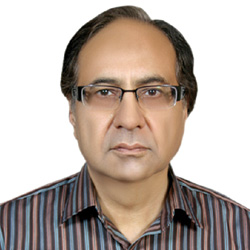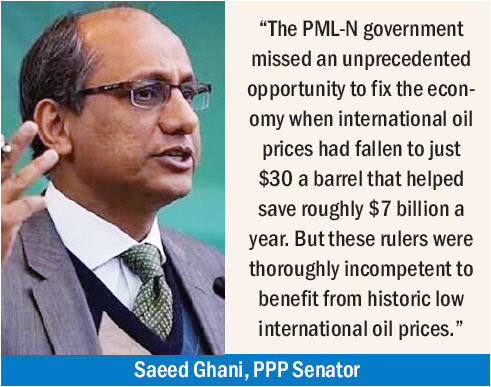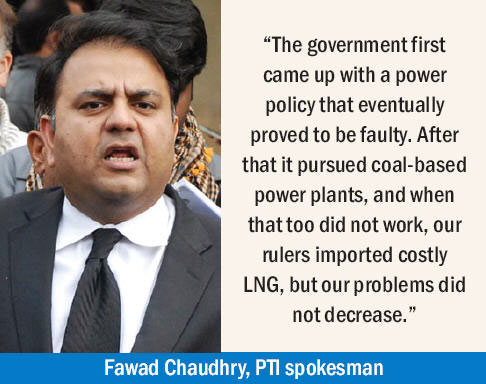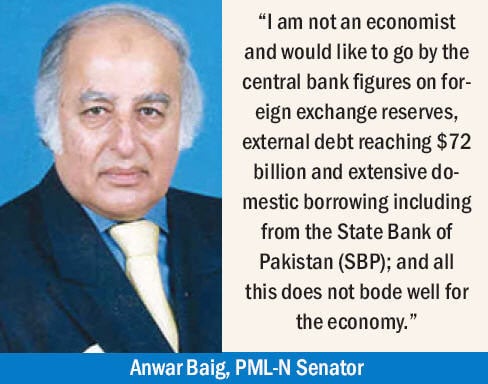INSIGHT
Pakistani economy suffered tragically due to the callous handling by three major political parties in the last few years with no one accepting the responsibility for its dwindling graph. The blame game has been the easiest way out for all governments; conveniently shifting the burden on others.
 The growing chasm between these parties over Panama gate scandal is sure to compound the economic woes and spell disaster for many political stalwarts in the next general elections.
The growing chasm between these parties over Panama gate scandal is sure to compound the economic woes and spell disaster for many political stalwarts in the next general elections.
The perceived charter of economy being occasionally spearheaded by the Pakistan Muslim League-Nawaz (PML-N) government did not receive any support from the major political parties following a much trumpeted charter of democracy (COD) signed between late Benazir Bhutto and Nawaz Sharif during their exile in May 24, 2006 in London.
It would be unfair not to give some credit to finance minister Ishaq Dar for pushing early signing of the proposed charter of economy on the pattern of COD - the objective of which was to achieve consensus on broader economic issues, which were not to be compromised in any circumstances.
However, Dar apparently did not succeed even in convincing the Pakistan Peoples’ Party (PPP) leadership with whom he has always enjoyed personal relations, especially with Asif Ali Zardari and leader of the opposition Syed Khurshid Shah. Since the ruling party did not oblige the beleaguered PPP - now of Bilawal Bhutto Zardari - on various issues and is failing to have interior minister Chaudhry Nisar Ali Khan fired from the cabinet, there is hardly any possibility of the two main parties signing another so-called charter on economy.
Cabinet ministers and ruling party stalwarts do not miss any opportunity to criticise opposition parties for blocking the road to development. They maintain they were not allowed by their detractors to concentrate on the economy during the last four years. They often refer to various international reports, including the Word Bank and Moody’s international credit rating agency that had said the Pakistani economy was on a path of recovery despite facing hardships and stagnation.
Prominent PML-N leader Senator Anwar Baig, though often critical of his own government, believed that had there been no fierce opposition by rival political parties, the government would have delivered to achieve the much needed economic turnaround.
However, he said his government could not be absolved over the infamous Panama scandal, under which it was taking refuge for not delivering on the economic front. “I am not an economist and would like to go by the central bank figures on foreign exchange reserves, external debt reaching $72 billion and extensive domestic borrowing including from the State Bank of Pakistan (SBP); and all this does not bode well for the economy,” he said, and added the failure to achieve $25 billion export target and falling home remittances, should be an eye opener for the PML-N government.
“Someone must tell us why home remittances and exports are declining and why there is only concentration on building highways, motorways and metro buses,” Baig said, asking his government to look around for creating new jobs and alleviating poverty across Pakistan.
 He regretted that due to the lack of government interest in promoting manpower export to the Gulf Cooperation Countries (GCC), India has started chocking Pakistan economically by exporting its manpower to that region. In this regard, he referred to Indian Prime Minister Modi’s visit to Saudi Arabia, United Arab Emirates (UAE) and Qatar, where he successfully signed manpower protocols. “The question is why my leadership is not taking any notice of it. I have personally requested the prime minister as well as the finance minister on several occasions that we need to be very serious in promoting our manpower export with a view to get rid of our burgeoning external debt.”
He regretted that due to the lack of government interest in promoting manpower export to the Gulf Cooperation Countries (GCC), India has started chocking Pakistan economically by exporting its manpower to that region. In this regard, he referred to Indian Prime Minister Modi’s visit to Saudi Arabia, United Arab Emirates (UAE) and Qatar, where he successfully signed manpower protocols. “The question is why my leadership is not taking any notice of it. I have personally requested the prime minister as well as the finance minister on several occasions that we need to be very serious in promoting our manpower export with a view to get rid of our burgeoning external debt.”
The current $16 billion annual earnings through manpower exports, he pointed out, could be raised to $30 billion, which would surely help to bid good bye to international financial institutions (IFIs) and other foreign banks.
PPP Senator Saeed Ghani was of the view that his party suffered more than any other political party in terms of facing pressure from all sides, particularly the courts. The PML-N government today, he pointed out, was not experiencing any such pressure, including over postings and transfers being blocked by the superior courts under one pretext or the other. “But we never said that we were not allowed to deliver on the economic front.”
The government, he alleged, was solely responsible for the current political and economic instability, and had it formed a high powered judicial commission to probe Panama leaks scandal, the matter would have resolved.
“So, only the government is to be blamed and not the opposition parties for the current mess and chaos,” he said. The credit, he said, goes to PPP for unearthing the corruption of the present rulers by late General Nasirullah Babar and Senator Rehman Malik. “The investigation started during our government’s tenure, which led to Panama gate and other financial wrongdoings of Sharifs.”
He said the prime minister was accountable for increasing political and economic instability by lying on the floor of the house in the national assembly and in his address to the nation about his family’s ill- gotten wealth. “There is a huge contradiction between his two statements and that is why the ruling family is facing a hard time in the Supreme Court,” he said. It was happening for the first time that Sharifs were being taken to task, whereas PPP leaders have had enough of their bashing from the courts, including the disqualification of Yousef Reza Gilani as prime minister.
He said the PML-N government missed an unprecedented opportunity to fix the economy when international oil prices had fallen to just $30 a barrel that helped save roughly $7 billion a year. “But these rulers were thoroughly incompetent to benefit from historic low international oil prices,” he said blaming the government for not improving the economy.
 PTI spokesman Fawad Chaudhry maintained the government was only trying to make PTI and other opposition political parties a “scapegoat” and unfairly holding them responsible for the current political and economic crisis.
PTI spokesman Fawad Chaudhry maintained the government was only trying to make PTI and other opposition political parties a “scapegoat” and unfairly holding them responsible for the current political and economic crisis.
Panama gate, he said, had brought more economic instability and political uncertainty as the ruling party lied about its billions of dollars. Their failure in giving the money trail amply showed that they evaded taxes and laundered money to park their wealth in offshore companies and foreign banks.
Fawad accused the government, particularly the finance minister, of introducing flawed economic policies that did not benefit the institutions and individuals in the country. “The government first came up with a power policy that eventually proved to be faulty. After that it pursued coal-based power plants, and when that too did not work, our rulers imported costly LNG, but our problems did not decrease.”
The PTI spokesman said that no benefit could be availed from extremely low international prices and power plants based on furnace oil were set up only to offer expensive electricity to the consumers. “Then our rural economy was destroyed by the rulers, as farmers remained the worst sufferers during the last three years,” he said, and added that fiscal and current account deficits were widening and exports falling, while the rulers’ obsession with uneconomical motorways did not end. There is no economic preference, the $46 billion CPEC is a mystery, and other economic activities are not producing any results, he said.
“All blame goes to the government and not the opposition for not fixing the economy and they are answerable to the people, particularly in the coming elections,” Fawad said.
Though political bickering continues as the apex court decides the Panama gate case, there is a consensus among the national and international experts and multilateral agencies that Pakistan’s economic challenges are essentially structural and required reforms to avoid unsustainable twin deficits (fiscal and current account).
Since all successive governments took refuge in political expediency and did not accord preference to the economy, macroeconomic stability could not be achieved, which invariably led to the doors of IMF for emergency lending to avoid default. Though there is no immediate threat of default, the next two years are very important as Pakistan will have to make heavy repayments for which the new government after 2018 election may have to once again seek a bailout package from the IMF.
IMF officials have often been accused of failing to get the structural reforms agenda implemented, especially related to the energy and revenue sectors during their 12 reviews of the Pakistani economy. They kept granting waiver after waiver and no fiscal stabilisation was achieved nor power sector woes eliminated. It was in that backdrop independent economists started terming the role of the IMF as “partner in crime”. The country, instead of achieving a certain sustained growth rate had been burdened with more and more local and external debt.
 Had IMF played its true role, the country could have been provided a much needed window of opportunity to improve its low growth trajectory, ensuring sustained fiscal deficit by increasing tax-to-GDP ratio to 15 percent in the short run and 20 percent in the long run.
Had IMF played its true role, the country could have been provided a much needed window of opportunity to improve its low growth trajectory, ensuring sustained fiscal deficit by increasing tax-to-GDP ratio to 15 percent in the short run and 20 percent in the long run.
For three years, while the $6.6 billion Extended Fund Facility (EFF) continued, there was some pressure on the government to abide by the IMF conditions. However, since November 2016, there has been no such pressure, especially any limit over borrowing. The government officials do concede in their private interaction that the country needed a home-grown reforms programme to ensure higher tax revenue (not through scandalous indirect but direct taxes). This is how seven percent GDP growth rate is possible. Not only to bridge over the Rs1.4 trillion yawning gap between income and expenditure, but also to ensure additional spending of funds for improving declining or stagnating social indicators.
There is some satisfaction that Pakistan is no more in a low growth and high inflation equilibrium, and has lived through its severe power crisis. Also, one does not see a relentlessly constrained fiscal situation, though still not out of the woods with low foreign exchange reserves, and more foreign loans then improved exports and home remittances.
The officials of the ministry of finance and the central bank often claim the tide began to change in 2015 and that some window of opportunity opened in 2016 for reviving growth and achieving some fiscal stabilisation. But government’s critics build their argument by saying that improved economic results are shown to the nation through figure manipulation and it would be difficult to gauge the economy without honest assessment, which according to them is still very much of a concern.
The good thing is that gone are the days when the central bank’s quarterly, half yearly and annual reports used to be prepared only to avoid the wrath of the ministry of finance by being their monetary wing. Today, by and large, critics and independent economists like former finance minister Dr Hafiz Pasha term these SBP reports as “balanced and independent” for which the performance of its governor Ashraf Wathra should to be appreciated.
Going forward, there is a need to improve political and security environment to attract foreign direct investment (FDI) which is an important component for managing a better GDP growth. Likewise, the export package announced two weeks ago should help achieve the $25 billion target to improve the trade balance along with ensuring $20 billion home remittances set for the current financial year. The buzz word is completing second generation reforms by focusing more on economic issues instead of indulging in dirty politics which is plaguing the economy.
The writer is a senior journalist based in Islamabad